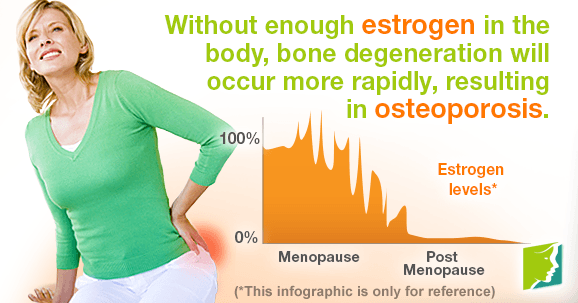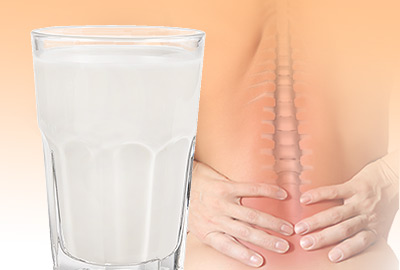Unfortunately, osteoporosis is a very common symptom of menopause. The many shifts taking place in a woman's body at this time often cause weakened bones, which can harm one's quality of life over time. Bone health is difficult to maintain and can be compromised over time for many different reasons.
Instead of letting the condition sneak up on you and cause injury, it is important to know the link between osteoporosis and hormonal imbalance. This is of particular pertinence to menopausal women, who are strongly affected by hormonal fluctuations. Learn more about the connection between menopause and bone health.
Osteoporosis Defined
Osteoporosis is a disease whose name comes from the Greek ostoun, meaning bones, and poros, meaning pores. It translates, then, to “porous bones”, which describes the characteristic weakening of the skeletal system. Frailer bones that lack density are prone to fracture upon even mild impact.
There are no visual or tangible symptoms of osteoporosis until injury, which typically occurs in the areas of the spine, hips, and wrists. Fractures can cause temporary or chronic pain, and sometimes require surgery. It is important to get a bone density test to ensure your bones are healthy.
Osteoporosis and Hormonal Imbalance
Menopausal and postmenopausal women are at most risk of developing osteoporosis. In fact, over 70% of individuals with osteoporosis are women over the age of 50. The main reason for this correlation is because of the dramatic disturbance of and decline in sex hormone levels.
Estrogen in particular is essential for healthy bones. This hormone plays a vital part in regulating the natural buildup and breakdown of bones. Without enough estrogen in the body to regulate the bone cycle, more bone is broken down than formed, causing bone degeneration to happen more quickly. Over time, this can lead to osteoporosis.
Other Causes
The other main reason why individuals develop osteoporosis is because of nutrient deficiency. While calcium is most definitely essential for building strong bones, it is not the only dietary player. Vitamin K and magnesium are equally important for calcium absorption, as well as making sure these nutrients get directed to the bones.
It is also a fact that cigarettes greatly increase a person's risk. Not only do the chemicals in cigarettes lower estrogen levels, but they also disrupt the bone cycle, causing bones to degenerate faster than normal. Thyroid conditions have also been found to have a correlation.
If you or someone you love is at a stage in their life where hormone levels are erratic or plummeting, it is essential you take quick action to check bone density levels. Because of the lack of signs and symptoms, failure to get tested for osteoporosis can lead to painful injury. By balancing hormone levels, eating a balanced diet, and avoiding triggers, you can protect your bones. Navigate through the links below to read more about osteoporosis and to learn how to prevent and treat it.
Sources
- Krum, S.A. & Brown, M. (2008). Unraveling estrogen action in osteoporosis. Cell Cycle, 7(10), 1348-1352. Retrieved from http://www.ncbi.nlm.nih.gov/pubmed/18418063
- National Institute of Arthritis and Musculoskeletal and Skin Diseases. (2014). What is Osteoporosis? Retrieved April 1, 2016, from http://www.niams.nih.gov/Health_Info/Bone/Osteoporosis/osteoporosis_ff.asp
- University of Maryland Medical Center. (2012). Osteoporosis. Retrieved April 1, 2016, from http://umm.edu/health/medical/reports/articles/osteoporosis



